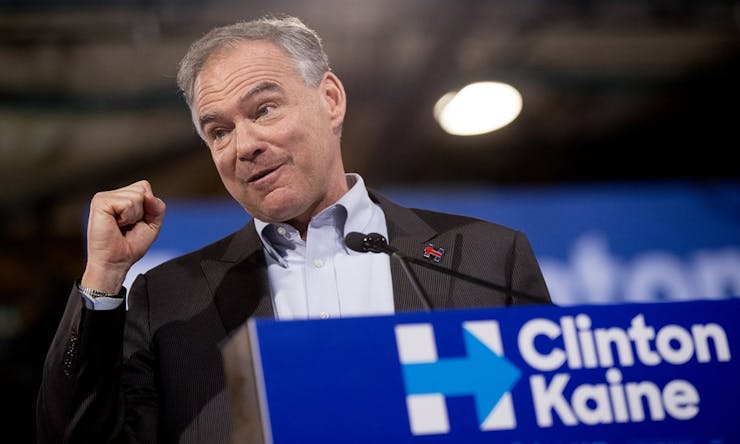With a prime-time speaking slot at the Democratic National Convention tonight, Virginia Sen. Tim Kaine will introduce himself to America for the first time since he was announced last week as Hillary Clinton’s running mate. After much speculation about the more exciting veep candidates — Elizabeth Warren, Cory Booker, Sherrod Brown, Tom Perez — Clinton chose Kaine as a safe, strategic political move. The swing state of Virginia will almost certainly swing in Clinton’s favor now.
Kaine’s mainstream establishment credentials are strong: He’s a white guy from a conservative state, he’s a Harvard Law graduate, and he serves on the Senate Foreign Relations and Armed Forces committees. And he plays the harmonica. For those in favor of immigration reform, he’s a saint. Political commentator Samantha Bee has blessed him as a walking, talking, Spanish-speaking hug.
For the cannabis-conscious voter, though, Kaine can be described in one word: unimpressive.
In March, when he participated in a local high-school political forum, Kaine responded to a question about cannabis decriminalization with this: “I wouldn’t vote for a law at the federal or state level that would decriminalize marijuana.”
That’s about as unambiguous as it gets.
Kaine’s home state of Virginia remains one of the few states with zero medical marijuana legality, and it still administers harsh, 1980s-style penalties for cannabis possession. For a first-time offense, the possession of less than half an ounce of cannabis is punishable by 30 days in jail.
In a 2014 interview with WMRA radio, Kaine expounded on his beliefs. “I’ve never been a legalization fan,” he said. “Just for a whole series of both health and sort of crime-related reasons, I think it would not be a good idea.”
Kaine is, however, a proponent of sentencing reform, particularly for low-level cannabis offenses. “I think, often, for sentences for marijuana and marijuana usage, I think some sentences are too strict,” Kaine said in the same radio interview. “These are often, if they’re nonviolent crimes, I think it could be handled in a different way on a sentencing standpoint.”
Is there room for Kaine to evolve on the issue? Possibly. Much like Hillary, he believes in respecting states’ rights. During a Senate hearing that examined the effect of state legalization on drug cartels, he was quoted as saying, “I actually kind of like this notion of the states as labs, and they can experiment and we can see what happens.”
That’s certainly not the first time we’ve heard the old “laboratories of democracy” quote in reference to cannabis. It’s even in the Democratic Party’s official platform on drug policy.
A Clinton–Kaine ticket may not revolutionize America’s cannabis laws during the next four years, but their views and policies align to lean toward allowing the state “democracy labs” to continue their experiments. For those of us lucky enough to live in legalized medical and recreational states, both Kaine and Clinton seem to recognize that if it ain’t broke, don’t fix it.







